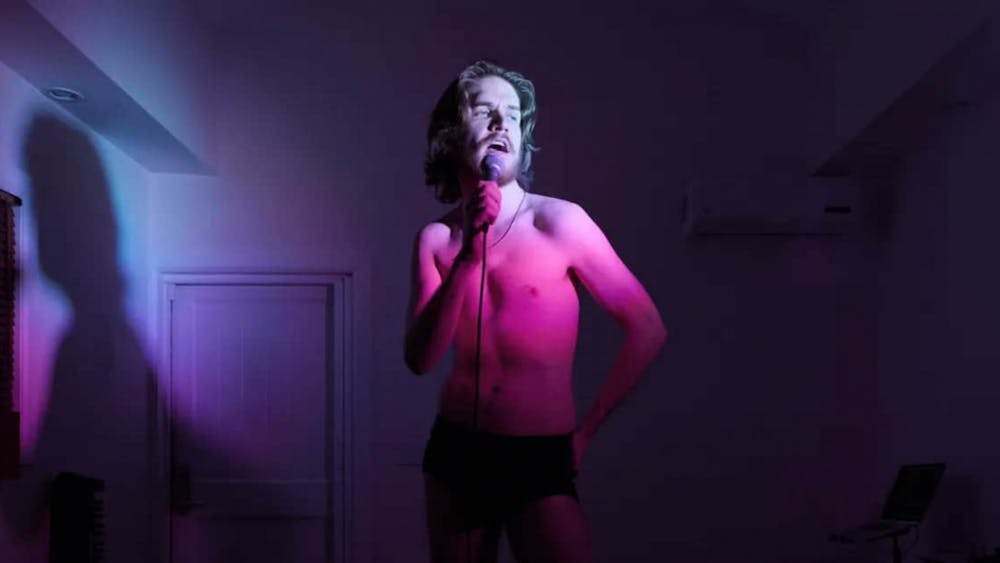On May 30, comedian Bo Burnham released his Netflix special “Inside,” a one-man performance written, filmed and edited entirely by himself. Created throughout the pandemic, Burnham addressed the boredom and loneliness of quarantine routines, such as facetiming your mom every day or feeling as if you spent the whole day in a cycle of standing and sitting and crying.
The artist has long made self-aware comments regarding the privilege of being a straight white man, or the inability of comedy to create any “real” change, and expanded upon these topics in his latest special. Yet, Burnham also provided a deeply personal and nonetheless relatable perspective into the exhaustion and hopelessness of our modern psyches.
The all-too-honest “That Funny Feeling,” now trending on TikTok to describe waves of dissociation and emptiness, captures how desensitized we’ve become to the constant wave of national traumas and concerns filling our feeds. It’s not that we don’t care — we’re just tired. Tired of the pressure to have an opinion on everything, tired of “the backlash to the backlash to the thing that’s just begun.” But when you can’t break free from the addicting accessibility of our digital drugs, you’re left with nothing but that funny feeling.
Of all the comical cultural commentary, though, none was quite as disturbing as “Welcome to the Internet.” Aptly sung in the style of a cartoon villain, the song speeds up as it progresses, feeling just like falling down the rabbit holes of the internet. The artist described how overwhelming the internet can be: when you have access to, as Burnham describes, “everything all of the time,” it’s nearly impossible to feel satisfied. And for our generation specifically — “Zillennials,” or the older members of Gen Z — most of us were never given a chance to develop as individuals without this online performance anxiety interfering. Yes, we were innocently testing out grainy Instagram filters, but we were also exposed to pro-eating disorder content on Tumblr and leering older men on Omegle. We grew dissatisfied with our appearance, our digital popularity and, for performers such as Bo, our ability to please others.
The comedian rose to fame on YouTube: he started uploading videos 14 years ago, a hunched teenager playing a keyboard in the back corner of his bedroom writing clever puns about race and sex and sexuality and all the other inappropriate topics appropriate among high school boys.
In 2013, he released his first Netflix special, “what.” This was my personal introduction to the artist and his qualms with the entertainment industry, particularly in the first video of him my middle-school self watched, “Repeat Stuff.” He had made previous songs about the simultaneous self-absorbance and exploitation of entertainers, but didn’t truly reveal how it affected him until his 2016 special “MAKE HAPPY.” In the final song of the show, he sneaks his performance anxiety inside jokes about Pringles cans and Chipotle burritos, telling the audience, “I want to please you, but I want to stay true to myself.” He walked off the stage, then took a five-year break from performing.
After “MAKE HAPPY,” Burnham still worked on films such as “Eighth Grade” and “Promising Young Woman,” but did not release any new content until now (and he knows that’s what we, as an audience, have been waiting for: “Daddy made you your favorite, open wide, here comes the content”). He was suffering from panic attacks during live performances, and quarantine — though not beneficial for general mental health — provided an opportunity to create content without a live audience. Yet, it is still demanding to write, record and edit an entire special alone — it took Burnham over a year to create this hour and a half performance. And though there is no doubt that live performances are incomparable to recorded shows, Bo’s “Inside” begs the question: what about artists who prefer to perform online? Should we demand that all artists offer live performances? Should we prioritize our need for content over an entertainer’s mental health?
Bo Burnham was always funny, smart, self-aware and slightly cynical. He still is. But the growing demands of the internet, and the world, for that matter, may require that more of his content involves “just me and my camera, and you and your screen, the way that the lord intended.”
Get The Chronicle straight to your inbox
Signup for our weekly newsletter. Cancel at any time.

